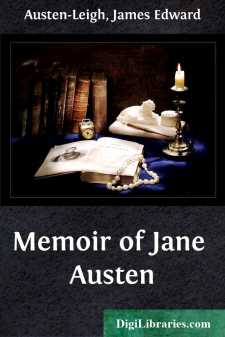Categories
- Antiques & Collectibles 13
- Architecture 36
- Art 48
- Bibles 22
- Biography & Autobiography 813
- Body, Mind & Spirit 142
- Business & Economics 28
- Children's Books 17
- Children's Fiction 14
- Computers 4
- Cooking 94
- Crafts & Hobbies 4
- Drama 346
- Education 46
- Family & Relationships 57
- Fiction 11829
- Games 19
- Gardening 17
- Health & Fitness 34
- History 1377
- House & Home 1
- Humor 147
- Juvenile Fiction 1873
- Juvenile Nonfiction 202
- Language Arts & Disciplines 88
- Law 16
- Literary Collections 686
- Literary Criticism 179
- Mathematics 13
- Medical 41
- Music 40
- Nature 179
- Non-Classifiable 1768
- Performing Arts 7
- Periodicals 1453
- Philosophy 64
- Photography 2
- Poetry 896
- Political Science 203
- Psychology 42
- Reference 154
- Religion 513
- Science 126
- Self-Help 84
- Social Science 81
- Sports & Recreation 34
- Study Aids 3
- Technology & Engineering 59
- Transportation 23
- Travel 463
- True Crime 29
Memoir of Jane Austen
Categories:
Description:
Excerpt
CHAPTER I.
Introductory Remarks—Birth of Jane Austen—Her Family Connections—Their Influence on her Writings.
More than half a century has passed away since I, the youngest of the mourners, attended the funeral of my dear aunt Jane in Winchester Cathedral; and now, in my old age, I am asked whether my memory will serve to rescue from oblivion any events of her life or any traits of her character to satisfy the enquiries of a generation of readers who have been born since she died. Of events her life was singularly barren: few changes and no great crisis ever broke the smooth current of its course. Even her fame may be said to have been posthumous: it did not attain to any vigorous life till she had ceased to exist. Her talents did not introduce her to the notice of other writers, or connect her with the literary world, or in any degree pierce through the obscurity of her domestic retirement. I have therefore scarcely any materials for a detailed life of my aunt; but I have a distinct recollection of her person and character; and perhaps many may take an interest in a delineation, if any such can be drawn, of that prolific mind whence sprung the Dashwoods and Bennets, the Bertrams and Woodhouses, the Thorpes and Musgroves, who have been admitted as familiar guests to the firesides of so many families, and are known there as individually and intimately as if they were living neighbours. Many may care to know whether the moral rectitude, the correct taste, and the warm affections with which she invested her ideal characters, were really existing in the native source whence those ideas flowed, and were actually exhibited by her in the various relations of life. I can indeed bear witness that there was scarcely a charm in her most delightful characters that was not a true reflection of her own sweet temper and loving heart. I was young when we lost her; but the impressions made on the young are deep, and though in the course of fifty years I have forgotten much, I have not forgotten that ‘Aunt Jane’ was the delight of all her nephews and nieces. We did not think of her as being clever, still less as being famous; but we valued her as one always kind, sympathising, and amusing. To all this I am a living witness, but whether I can sketch out such a faint outline of this excellence as shall be perceptible to others may be reasonably doubted. Aided, however, by a few survivors who knew her, I will not refuse to make the attempt. I am the more inclined to undertake the task from a conviction that, however little I may have to tell, no one else is left who could tell so much of her.
Jane Austen was born on December 16, 1775, at the Parsonage House of Steventon in Hampshire. Her father, the Rev. George Austen, was of a family long established in the neighbourhood of Tenterden and Sevenoaks in Kent. I believe that early in the seventeenth century they were clothiers. Hasted, in his history of Kent, says: ‘The clothing business was exercised by persons who possessed most of the landed property in the Weald, insomuch that almost all the ancient families of these parts, now of large estates and genteel rank in life, and some of them ennobled by titles, are sprung from ancestors who have used this great staple manufacture, now almost unknown here.’ In his list of these families Hasted places the Austens, and he adds that these clothiers ‘were usually called the Gray Coats of Kent; and were a body so numerous and united that at county elections whoever had their vote and interest was almost certain of being elected.’ The family still retains a badge of this origin; for their livery is of that peculiar mixture of light blue and white called Kentish gray, which forms the facings of the Kentish militia.
Mr....


